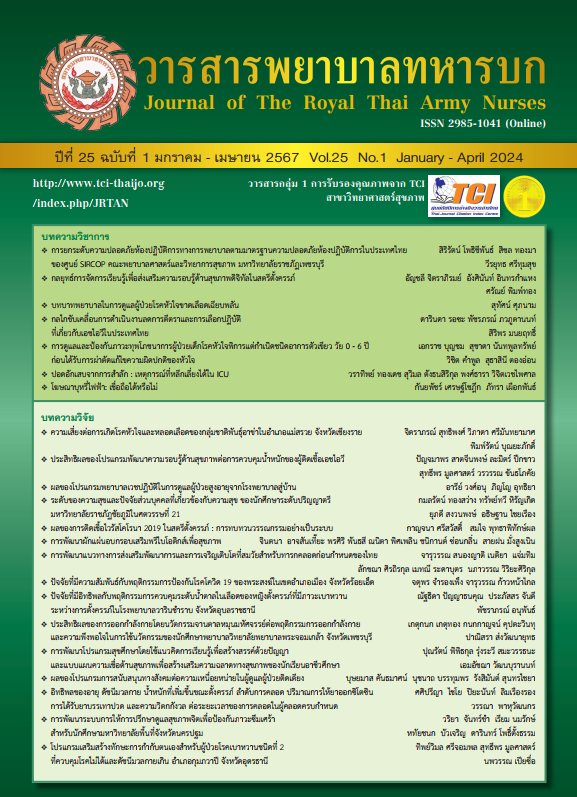Effects of the Promoting Smoking Cessation Program on Smoking Cessation Behavior using Teamwork Approach and Self-efficacy of full-time workers in the Workplace, Samut Sakhon Province
Keywords:
Teamwork approach, Smoking cessation behavior, Full-time workersAbstract
This research was a two-group quasi-experimental pretest-posttest design. The aim was to examine the effects of the promoting smoking cessation program on smoking cessation behavior using teamwork approach and self-efficacy of full-time workers in the workplace, Samut Sakhon Province. The samples consisted of 60 full-time workers in the workplace, Samut Sakhon province. Each group included 30 persons. The experimental instrument was a promoting smoking cessation program on smoking cessation behavior using teamwork approach and self-efficacy that was examined for content validity by 3 experts. The Reliability of questionnaire on the nicotine dependence was .80. Data were analyzed using descriptive statistics, Chi-square, Pair-sample t-test, Wilcoxon signed ranks test, independent-sample t-test, and Mann-Whitney U test. The results showed that after the intervention, the nicotine addiction level and the number of cigarettes smoked per day in the experimental group were decreased when compared to the pre-intervention period (p < .05) and the control group with statistical significance (p < .05). In addition, the smoking cessation success of the experimental group was higher than the control group with statistical significance (p < .05). The study’s findings could serve as a guideline for the workplace’s stakeholder team to promote effective smoking cessation in the workplace for full-time workers to quit smoking.
Downloads
References
World Health Organization. Smoking and COVID-19. Geneva: World Health Organization; 2020.
Tobacco Control Research and Knowledge Management Center. Report on the Situation of Tobacco Consumption in Thailand 2019. 1st ed. Bangkok: Sintaveekit printing; 2019. (in Thai)
Patanavanich R, Glantz SA. Smoking is associated with worse outcomes of COVID-19 particularly among younger adults: a systematic review and meta-analysis. BioMed Central Public Health. 2021; 21: 1-9.
National Statistical Office. The smoking and drinking behavior survey 2017. Bangkok: National Statistical Office; 2017.
Kalampakorn S, Jirapongsuwan A, editors. A nursing practice guideline for smoking cessation. 1st ed. Nonthaburi: Publishing of Suetawan; 2020. (in Thai)
Cahill K, Lancaster T. Workplace interventions for smoking cessation. Cochrane Database of Systematic Reviews. 2014; (2): 1-107.
Chatdokmaipra K, Pitayarangsarit S, Kalampakorn S. Policy recommendation entitled: Measures and motivation to reduce tobacco consumption in industrial and agricultural workers. Thai Journal of Nursing. 2019; 68(2): 51-9. (in Thai)
Chomchuen P, Rawiworrakul T, Kalampakorn S. Readiness to quit smoking among industrial workers in Ratchaburi Province. Thai Journal of Nursing. 2019; 68(2): 27-34. (in Thai)
Bandura A. Self-efficacy: the exercise of control. New York: W.H. Freeman & Company; 1997.
Papralit S, Kalampakorn S, Sillabutra J. The Effects of Brief Smoking Cessation Education Program and Telephone Follow up in Roofing Products Industry, Saraburi Province. Thai Journal of Nursing. 2016; 65(1): 28-38. (in Thai) 11. Robbins SP. Organizational Behavior. 11th ed. New Jersey: Pearson Education; 2005.
Graham AL, Papandonatos GD, Jacobs MA, Amato MS, Cha S, Cohn AM, et al. Optimizing Text Messages to Promote Engagement With Internet Smoking Cessation Treatment: Results From a Factorial Screening Experiment. Journal of Medical Internet Research 2020; 22(4): e17734.
Samut Sakhon Hospital. Summary of the results of the annual walk-through survey report 2020. Samut Sakhon; 2020.
Polit DF, Hungler BP. Nursing research: Principles and methods. 6th ed. Philadelphia: Lippincott; 1999.
Karunan K, Manasurakarn J, Thaniwattananon P. The Effects of an Integrated Program of Behavior Modification with Self-Efficacy on Smoking Cessation Behaviors and Self-Efficacy among Patients with Chronic Obstructive Pulmonary Disease. The Southern College Network Journal of Nursing and Public Health. 2018; 5(1): 47-61. (in Thai)
Sriphan I. The effect of varenicline for smoking cassection. The Office of Disease Prevention and Control 10th Journal 2018; 16(2): 81-92. (in Thai)
Velicer WF, Prochaska JO, Rossi JS, Snow M. Assessing outcome in smoking cessation studies. Psychol Bull. 1992; 111: 23-41.
Pantaewan P. Self-Efficacy Theory and Smoking Cessation. Journal of The Royal Thai Army Nurses. 2017; 18(3): 35-43. (in Thai)
Saehan T, Hiranrat S, Aimsaeng K, Nuengsin K, Aumpan N, Khammuang P, et al. Effects of the promoting smoking cessation program among security guards in a university. Thai Journal of Nursing. 2020; 69(1): 1927. (in Thai)
Action on Smoking and Health Foundation Thailand. The Situation and Problem of Tobacco Consumption in Thailand. Thailand; 2018. (in Thai)
Downloads
Published
How to Cite
Issue
Section
License
Copyright (c) 2024 Journal of The Royal Thai Army Nurses

This work is licensed under a Creative Commons Attribution-NonCommercial-NoDerivatives 4.0 International License.
บทความหรือข้อคิดเห็นใดใดที่ปรากฏในวารสารพยาบาลทหารบกเป็นวรรณกรรมของผู้เขียน ซึ่งบรรณาธิการหรือสมาคมพยาบาลทหารบก ไม่จำเป็นต้องเห็นด้วย
บทความที่ได้รับการตีพิมพ์เป็นลิขสิทธิ์ของวารสารพยาบาลทหารบก
The ideas and opinions expressed in the Journal of The Royal Thai Army Nurses are those of the authors and not necessarily those
of the editor or Royal Thai Army Nurses Association.






